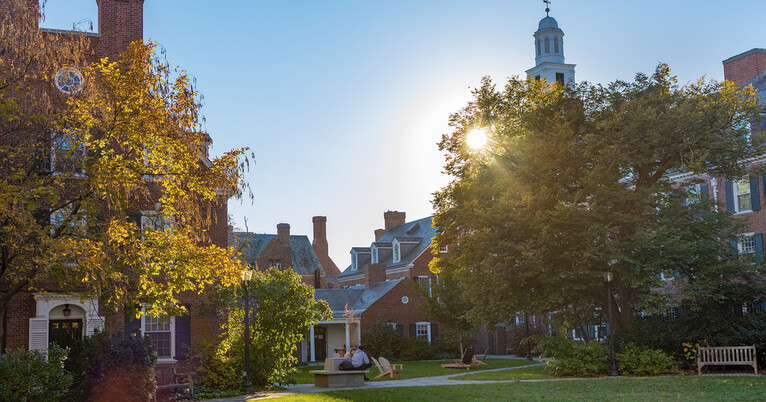Meeting student mental health needs at Yale: Q&A with Paul Hoffman
Paul Hoffman became director of Yale Health’s Department of Mental Health and Counseling in February 2020, after providing direct clinical care for 13 years.
A top priority for Hoffman and his team was establishing a long-term plan for expanding Yale’s student mental health services to meet a steady rise in demand — a demand soon exacerbated by the stresses of the COVID-19 pandemic. In 2015, the mental health and counseling department saw fewer than 2,600 students; in 2021, it saw 5,000.
Today Yale offers a broader range of treatment options, shorter wait times for appointments, and a larger, more diverse clinical staff. Additional hires are in progress.
Hoffman sat down with Yale News to discuss new student resources, their impact so far, and what’s next.
How have campus mental health services grown in recent years?
Paul Hoffman: We’ve added new programs and more staff to the main counseling center since the start of the pandemic — a clinical personnel increase of 65 percent, representing 24,000 additional hours of clinical care available annually. Across all types of mental health services, both those directly provided by Yale and through the Yale network, Yale students utilized about 55,000 mental health visits last year.
One of the biggest new initiatives has been embedding counselors in Yale College and in several professional schools, simplifying access to mental health services. Yale College Community Care, or YC3, embeds community wellness counselors and community care clinicians — these are licensed psychologists or licensed clinical social workers — in the residential colleges and classroom buildings. The idea was to lower the barriers for those seeking treatment and provide an easier, less formal way of getting in touch with professional care: we’re making sure providers are where the students are, allowing students to use mental health and wellness resources as they feel they need them, and allowing them to self-schedule with a provider they choose within a few days — often the same day. It has been a wildly successful program. Since 2021, nearly 1,900 students have taken advantage of YC3, totaling nearly 5,500 appointments.
Similar to YC3, we’ve embedded counselors in the Law School, the School of the Environment the Graduate School, and the School of Medicine. These counselors provide support and shorter-term therapy within those schools — literally in their buildings. We expect to embed counselors in additional professional schools over the course of this year.
Last year, Yale added 13 clinicians to the staff, seven of whom are part of the primary mental health and counseling team and the others assigned to YC3 and embedded programs. This year, we’ve already hired four additional clinicians, and we expect to add more. And to further enhance bandwidth, we have contracted an after-hours call service so students have access to mental health professionals 24/7; this was always the case, but bringing in this additional after-hours resource bolsters the capacity of our internal clinicians.
Have you found that new programs reach additional students?
Hoffman: Yes. For example, we do see that there are students who only use YC3 and not services within the main counseling center. But we also see significant overlap, with people using both. Some students who may regularly see a therapist at mental health and counseling — either virtually or in-person at the Lock Street main office or our satellite location — may also drop in to see somebody through YC3, either because something has come up in between their regular sessions that they want to talk about or because they’re looking for a different resource or type of support.
So, new programs both reach more students and offer additional resources to students already utilizing mental health services.
How do you measure success, and how have new initiatives and the expanded staff met those measures?
Hoffman: The big thing is wait times for appointments: We’ve had a really significant drop compared to last year. This year, wait times are often around 3 to 4 days for non-emergency first appointments. Medical emergencies are triaged immediately. The additional staff was a critical component of that. We also streamlined the process that helps students connect with clinicians much faster and prioritizes continuity of care so students can easily continue to see providers they’ve met with previously. Part of the streamlining was switching to electronic medical records, which allows students to communicate with their clinicians directly through MyChart; we used to have to rely on phone calls, which did not always work well with this generation.
The diversity of our staff has also grown significantly in the last three years, which allows us to better meet the needs of our diverse student body. And we’ve hired our first director of diversity, equity, and inclusion this year to further support that effort.
What expansions can students expect in the near future?
Hoffman: Along with hiring more clinicians and embedded counselors, we’re opening a third location. We opened our first satellite clinic last year at 205 Whitney Ave. to accommodate our staff growth and spread access across campus. Our third location will open this year close to Old Campus, at 60 Temple St. We’re committed to meeting students’ mental health needs, and will continue to grow in order to do so.
Is it complicated to return to Yale after a mental health withdrawal?
Hoffman: For the overwhelming majority of students, it’s straight-forward, and the process is explained to every student when they initially request a withdrawal. Over 90 percent are reinstated upon their first request, and over 99 percent on their second request. In recent memory, no one has had to make more than three requests.
The reinstatement process is run by Yale College, which has been steadily working to make the process simpler for students. Last spring, for example, they dropped the requirement for students to demonstrate readiness by taking outside courses; that is now only required for students who are withdrawn for more than two calendar years.
Students have been important collaborators in this process, helping us understand and alter the pressure points. There used to be a meeting with the chair of the reinstatement committee, for example, which was intended to be a supportive source of information. But some students found it intimidating, so that part of the process has been dropped. Hearing that students sometimes find it a bit challenging to return, we are about to start pairing them with YC3 wellness specialists as another source of support.
How can students make an appointment with mental health and counseling or YC3?
Hoffman: For mental health and counseling, call 203-432-0290 to speak with a receptionist and schedule a first-time appointment. You’ll then meet with a clinician and make a plan for treatment from there. For YC3, you can schedule an appointment through the program website.













